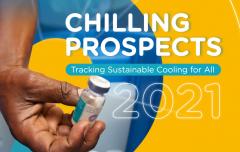Sustainable cooling solutions in action
|
Across human comfort and safety and medical and agricultural cold chains, small- to mid-size cooling businesses are working to generate technological solutions and take advantage of new business models. Innovation and intervention not only in technologies but also in the services, policies and financial solutions are needed to support them. |
As sustainable cooling solutions are piloted and demonstrated across the developing world, more data about their impacts on the local level are becoming available. Understanding these impacts is critical for governments, cities, development institutions and non-governmental organizations (NGOs) in the design of policies and implementation of new initiatives dedicated to increasing access to sustainable cooling.
Solutions in action
This chapter explores some of those solutions through case studies provided by the Ashden Foundation, the Basel Agency for Sustainable Energy, the FAO, the Million Cool Roofs Challenge, and the Sustainable Energy for All (SEforALL) Youth Summit. The examples are driven by data to show the impact that sustainable solutions have on communities and people.
Rwanda: The growing market potential of solar cold storage for horticulture products
Sub-Saharan Africa: Youth-led solutions for vaccine and agricultural cold chain challenges
Bangladesh and Indonesia: The power of passive solutions
Take action with the This Is Cool campaign
Our This Is Cool campaign aims to bring greater awareness of the solutions and to show what can be done across the world to make sustainable cooling for all a reality. Find out more





